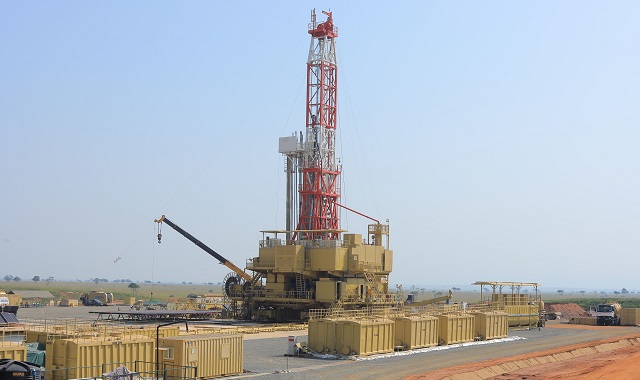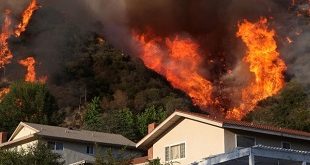
TotalEnergies starts drilling as activists pin their fading hopes on stopping pipeline
Kampala, Uganda | RONALD MUSOKE | Drilling of production wells for both the Kingfisher and Tilenga oil projects has picked up pace in recent months ahead of first oil scheduled for 2025.
“The drilling of production wells is proceeding as planned towards first Oil in 2025,” says Ernest Rubondo, the executive director of the Petroleum Authority of Uganda.
But this progress has not stopped local and international environmental activists to mobilise against Uganda’s oil project.
“We implore the international community, environmental activists, tourists, and all concerned individuals to join us in resisting this alarming venture,” says Dickens Kamugisha of the Africa Institute for Energy Governance (AFIEGO), a Kampala-based energy policy non-profit.
Oil to transform Ugandan society
But the Uganda government touts the expected windfall from the oil and gas activities, especially the development of infrastructure worth over US$ 15 billion in the country before commencement of production, together with the expected annual revenues in excess of US$ 1 billion. The government says this outlay of investment is beginning to significantly impact the country’s economy.
The government adds that, over the next 25 years, the oil project will provide a boost to investment in other sectors of the economy, bringing a potentially transformative impact for many Ugandans and the country at large.
As the back-and-forth arguments continue, the French oil major, TotalEnergies, is the latest joint venture partner to embark on drilling of the oil wells under the Tilenga Project. The initial phase, which began on June 28, will see the drilling of 12 development wells on the Jobi-5 well pad, which is part of the Tilenga oil fields.
Six months earlier, on Jan.24, the Chinese National Offshore Corporation (CNOOC), the other international joint venture partner in Uganda’s oil project, launched the start of its drilling of oil wells at the Kingfisher Oilfield in Kikuube District, in mid-western Uganda.
According to the Petroleum Authority of Uganda (PAU), the local industry’s regulatory agency, drilling of the first well for the Kingfisher field has been completed to a total depth of about 3000 metres, and the LR8001 rig has now moved to the location of the second well.
Meanwhile, Alex Nyombi, the Director of Development and Production at the Petroleum Authority of Uganda says three rigs have been designated for the drilling operations on the Tilenga project.
“Presently, SINOPEC 1501 is operational at the Jobi-5 well pad and commenced drilling operations on 28 June 2023,” he said, adding that, “The second rig is undergoing final tests at the Ngiri-3 well-pad before commencing drilling.” The third rig, Nyombi said, is being assembled and is expected to commence operations in October 2023. Nyombi said both rigs have “noise suppressing technology, are fully automated and environmentally friendly.”
Local industry experts say Uganda’s commitment to sustainable and responsible resource extraction is shown in the design of the drilling rigs. For instance, innovative technologies and eco-conscious practices have been employed.
“The rigs have been designed to minimise the environmental footprint, ensuring a positive impact on the ecosystem, and setting a precedent for future generations,” says the petroleum authority.
The proactive measures are also being shown in the scheduling of the drilling operations which are meant to ensure at least 70 wells are in place by 2025, facilitating the projected commencement of commercial production. However, overall, over 450 wells on 35 well-pads will be drilled leading to an estimated production of 230,000 barrels of oil per day, at its peak once production begins.
Civil society backlash
But these assurances have not stopped local and international environmental activists to mobilise against Uganda’s oil project. Back in January, just hours after the Chinese firm, CNOOC, began spudding its oil wells, civil society organisations in both Uganda and the Democratic Republic of Congo issued a joint statement calling on the government, CNOOC and TotalEnergies to prioritise the economic wellbeing of Ugandans, biodiversity conservation and climate action by investing in clean energy instead of “climate-wrecking projects such as Kingfisher, Tilenga and the East African Crude Oil Pipeline (EACOP).”
The CSOs said they are still concerned that the Kingfisher project involves drilling of 31 wells, some of which are onshore.
It was the same case on July 26 when the activists learnt about TotalEnergies’ spudding of its wells some of which are inside Murchison Falls National Park. The activists under their #StopEACOP pressure group noted that they are “deeply disturbed and gravely concerned by recent developments— TotalEnergies’ commencement of oil drilling activities in Murchison Falls National Park.”
The Protected Area is one of Uganda’s oldest, largest and most visited national parks and is a sanctuary of global significance. It is renowned for its irreplaceable biodiversity and unparalleled natural beauty.
The park is home to 76 species of mammals -including elephants, lions, and giraffes and over 450 bird species, making it a remarkable and unique, irreplaceable ecosystem. The park is also home to the Murchison Falls-Albert Delta Wetland System, a Ramsar Site of international importance. The Ramsar site is an important spawning ground for the Lake Albert fisheries.
In 2018, the activists say, Lake Albert accounted for the highest fish catch, 43%, in Uganda. The activists note in their statement that TotalEnergies move “threatens not only the biodiversity of the park but also its standing as a beloved tourist hub and a key contributor to Uganda’s economy.”
“The tourism industry, heavily reliant on the park’s existence, plays a crucial role in Uganda’s economy, generating significant revenue and creating countless livelihoods. In 2022 for instance, tourism accounted for 59% of Uganda’s exports, earning the country US$ 1.047 billion.”
According to the activists, drilling for oil in Murchison Falls National Park puts these benefits at grave risk, threatening the socioeconomic fabric of Uganda.
Fishing is a multi-million-dollar industry in Uganda and the sector employs over 5 million people (direct and indirect employment). Activists say the Lake Albert fisheries are being put at risk by Total’s oil drilling in Murchison Falls National Park as the oil company’s activities are within the Area of Influence of the Murchison Falls-Albert Delta Ramsar.
Amidst the above, TotalEnergies says the drilling rig in Murchison Falls National Park “is painted with beige colour to resemble the surrounding Savannah grasslands” to reduce the impact on wildlife. It says its activities will only affect 0.003% of Murchison Falls National Park but activists say this ignores impacts that go beyond the surface of the well pads.
Roads have been built inside the park, with approximately 600 truck trips registered through the park per month during the construction phase. Over 2,000 trips a day between wells, translating into 61,600 a month, are expected during the exploitation phase.
“The impacts of oil activities on wildlife are already very real. In particular, fleeing the noise and dust, elephants are increasingly going out of the national park, destroying the crops of neighboring communities and endangering men, women and children. Women and children have been killed by elephants in Buliisa District,” the activists say.
“Preserving Murchison Falls National Park and maintaining its biodiversity is a matter of national interest to Uganda and a global responsibility,” said Dickens Kamugisha of Africa Institute for Energy Governance (AFIEGO), a Kampala-based energy policy non-profit.
“While the ravages of climate change are being felt more than ever, Total is breaking every conceivable boundary by starting oil extraction in one of the world’s most important biodiversity hotspots,” said Juliette Renaud, senior campaigner at Friends of the Earth France.
The activists argue that despite the global outcry and robust resistance from frontline communities and environmental groups, the interests of these companies are primarily focused on profit, with scant regard for the devastating environmental and socio-economic consequences their actions may unleash.
Yet, despite the sustained pressure from the civil society activists, government officials and the joint venture partners say the project is on course.
Expected benefits
The officials say that to ensure the economic benefit from the projects, the government has set national content development targets. For instance, the government wants at least 40% of the amount spent to remain within the country’s economy through the use of Ugandan goods and services and by training Ugandans to undertake the work.
The government is also strengthening links between the new oil sector and existing parts of the economy, such as agriculture, tourism, manufacturing and education. These initiatives, government officials say, will earn local businesses about US$8billion during the four-year construction phase of the projects.
But the activists are yet to be persuaded by this optimism.
“Despite this recent development, activists worldwide must be reminded that it is not too late to stop oil exploitation in Murchison Falls National Park. While drilling has begun, the operation cannot reach its peak without the development of EACOP,” said Zaki Mamdoo, the #StopEACOP Campaign Coordinator.
“This remains our task- to stop EACOP is to stop decades of oil exploitation in Murchison Falls, on Lake Albert and across the entire region. Total and their partners should be made to count their losses now, for the world stands to lose so much more.”
 The Independent Uganda: You get the Truth we Pay the Price
The Independent Uganda: You get the Truth we Pay the Price


